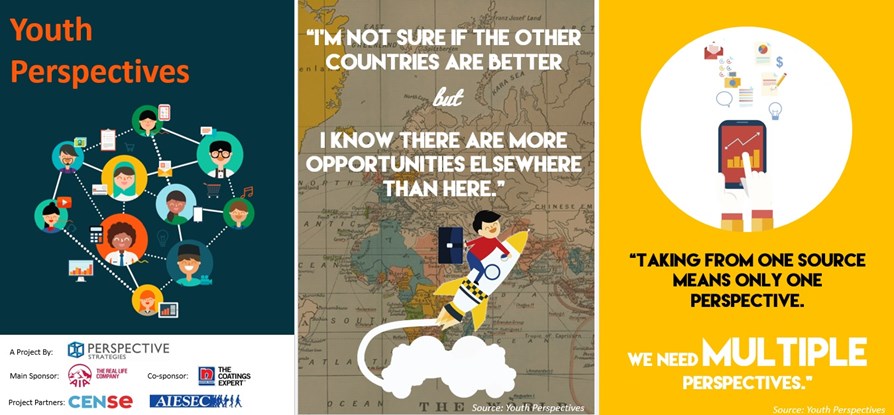

Results of a nationwide survey involving more than 2,000 undergraduates and Form 6 students released today have debunked some common perceptions of Malaysian youth. This group of young Malaysians who will be entering the workforce over the next 12 to 24 months, is still family-oriented when it comes to making career and purchasing decisions as well as possessing the ability to question the validity of the sources of information.
Such attributes bode well for these future job seekers but employers and businesses must be prepared to adapt to accommodate and get the most out of them.
“The study, Youth Perspectives, certainly unveiled interesting findings of the perspectives of young Malaysians, who will shape the way organisations attract, engage and retain their young talent and consumers,” said Andy See, Managing Director of Perspective Strategies, the stakeholder engagement consultancy which undertook the research project in partnership with AIA Berhad, Nippon Paint Malaysia Group, Centre for Strategic Engagement (CENSE) and AIESEC in Malaysia.
“The study shows us that modern-day parents are playing an increasingly profound role in their children’s career options as well as purchasing habits. While sceptics may baulk at them for being overly dependent on their parents, some global firms have begun embracing this cultural change by involving parents in the process of engaging our youth.
“Such is the trend that Human Resources (HR) professionals shouldn’t be surprised to find parents accompanying their children to job interviews! Our experience certainly confirms the increasing involvement of parents in such situations,” said See.
Youth Perspectives involved a survey (online and printed questionnaire) of 2,021 young Malaysians from public and private universities as well as Form 6 students. A total of 11 focus group discussions were also conducted to gather qualitative information.
Carried out between January and March 2015, Youth Perspectives focused on three areas namely young Malaysians’ media consumption habits, purchasing behaviour and their assessment of their talent and career opportunities.
Word-of-mouth from families and friends is the key influence on young Malaysians. The majority viewed their families and friends as the reliable source of information and consultation when making major life decisions such as their finances and careers. As many as 80.6% would seek their friends review and 77.0% would consult their families when making a purchase decision.
On top of that, about 66.8% of them would prefer turning to their families and friends for job referrals. Interestingly, while this generation is “hooked on” social media, only 35.4% would consider using this channel to find a job.
“When it comes to influencing young Malaysians, nothing beats word-of-mouth. They trust their families and friends above all forms of marketing channels. However, it is important to note that word-of-mouth in today’s context also means virtual conversations or instant messages,” See explained.
As expected, young Malaysians are constantly connected with more than half of them (53.5%) spending at least five hours a day online. However, they see the Internet as no more than a platform or channel to connect with friends via social media and to be updated on news.
Despite the fact that they are “always-connected”, many are sceptical of the information published on social media. Only 9.2% of the respondents “trust” or “very trust” the information published on social media compared to 72.8% for parents and relatives.
See explained that discussions in focus groups also revealed that young Malaysians will verify their information against other sources, utilising multiple platforms such as websites, newspapers, magazines and even word-of-mouth. Hence, organisations need to communicate a consistent brand value and behaviour across all platforms to be trusted by this new generation of consumers.
“Organisations would need to start engaging youth beyond traditional and digital platforms in order to create meaningful relationships with them. Organisations must be genuine and sustain their communications and engagements. Otherwise, the initiatives are seen as no more than just publicity stunts,” he added.
The “soon-to-be graduates” also identified poor language and interpersonal skills as their weaknesses that will limit their career opportunities and progression. About 41.2% of young Malaysians placed soft skills as the challenge that may prevent them from securing their ideal career.
Young Malaysians acknowledged that their poor language skills will be a major hindrance to their careers. More than half (51.0%) of young Malays did not feel confident of their grasp of the English language, compared to Chinese (37.0%) and Indians (16.0%). Interestingly, 38.0% of Malays and 39.0% of Indians felt that their inability to communicate in Chinese may stifle their career progression.
A large percentage of young Malaysians (70.4%) have also expressed their desire to work in another country, signalling the continuing brain drain debate in Malaysia. Some of the reasons cited for their desire to move overseas include: Political and social reasons (45.2%), specialised field of career (particularly for science and engineering) are only available overseas (43.6%) and perceived poorer career prospects (42.1%) in Malaysia.
“While their desire to relocate to another country may be strong, focus group discussions also revealed that in the longer term, young Malaysians intend to return to Malaysia. After all, the heart belongs to where their home really is,” said See.
The Youth Perspectives report identified talent development as an important area that organisations must look into when developing engagement opportunities while enhancing its reputation with young Malaysians. Similarly, today’s consumers also expect their brands to invest in nurturing meaningful relationships with them.
“In the current context, the expectation on organisations to deliver on its commitment to stakeholders is very high. This is because today’s stakeholders can quickly lose interest or express their frustration in a very open and immediate manner especially via online platforms,” concluded See.
For media enquiries, please contact:
Joshua Lim | joshua.lim@perspective.com.my | 012 – 773 8433
Eric Lai | eric.lai@perspective.com.my | 017 – 337 2426
Click on the following link to read the full report: Youth Perspectives Report